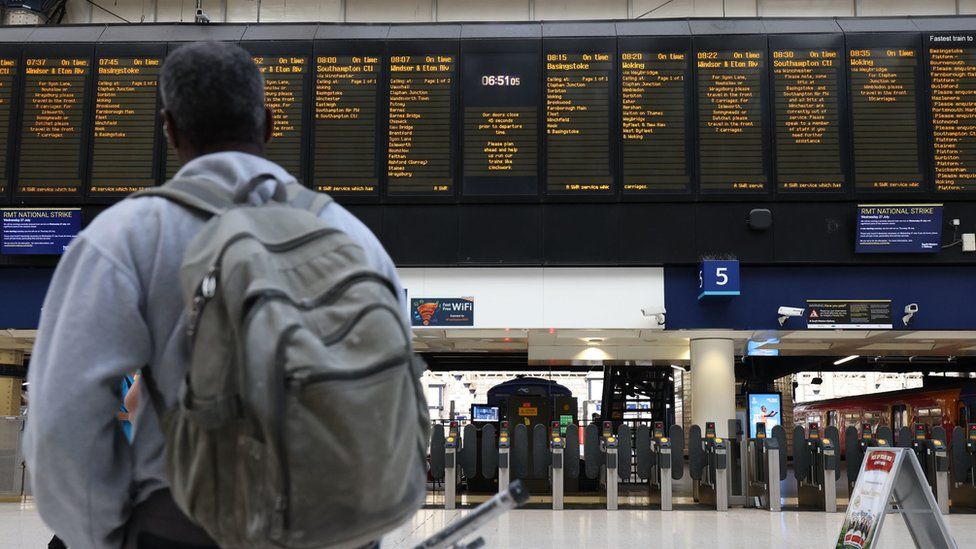ARTICLE AD BOX
 Image source, PA Media
Image source, PA Media
By Noor Nanji
Business reporter, BBC News
Rail passengers face more disruption this weekend with train drivers at 11 companies set to walk out on Saturday as part of a long-running pay row.
The strike by the Aslef union is set to affect people travelling to Christmas markets and major sporting events.
Passengers are being advised to check before they travel.
However, strike action at London Overground - which had been expected on Saturday - has been suspended while union members consider a new pay offer.
Regret on both sides
Aslef, which represents drivers, wants wages to keep pace with the rising cost of living. It said talks with rail firms broke down after no pay offer was made.
"We regret that passengers will be inconvenienced for another day. We don't want to be taking this action," said Aslef's general secretary Mick Whelan.
The Rail Delivery Group, which represents train companies, said it was "incredibly frustrated" that Aslef's leadership had decided to take further strike action.
"We regret Aslef's decision, which will cause real disruption to passengers and hit its members' pay packets," a spokesman said.
A Department for Transport spokesperson said that the strike action was "disappointing and "unproductive, particularly due to its timing during the World Cup football tournament and a busy retail period.
"This dispute has gone on far too long and is not only causing disarray in people's lives, but is harming the economy too. We urge union leaders to reconsider this action and instead work with employers, not against them, to agree a new way forward. The future of our railway depends on it," the spokesperson added.
Which train companies are affected?
- Avanti West Coast - no services on the day
- Chiltern Railways - no services
- CrossCountry - no services
- East Midlands Railway - no services
- Great Western Railway - an "extremely limited" service
- Greater Anglia - "heavily reduced" service
- London North Eastern Railway - "limited" service
- Northern Trains - no services
- Southeastern - no services
- Transpennine Express - "very limited" service
- West Midlands Trains - no services
In addition to the 11 companies directly affected by the industrial action, Heathrow Express and London Northwestern Railway are also expected to be affected.
Operators that are not affected will run trains, but they may be very busy.
Passengers are being told they should check services before they travel, and to allow extra time for their journey.
Great Western Railway (GWR), which will run only an extremely reduced service on the day, has warned customers travelling to Christmas markets and major sporting events to avoid taking the train.
It said that as a result of the strikes, no GWR trains will serve Bath Spa for the opening Saturday of the city's Christmas market.
Fans heading to Cardiff for Wales' Autumn International against Australia, or to Twickenham to see England take on South Africa, could also face disruption.
'I hope the negotiations work out as it affects my future'
Image source, Cameron Hughes
Cameron Hughes, 21, from Surrey works in a supermarket warehouse, and says the trains not running means he can't see his girlfriend Natasha, who lives in Bournemouth.
He is particularly reliant on trains for travel this weekend as he is not allowed to drive, since his doctor suspects he may have epilepsy.
"If my epilepsy diagnosis is confirmed, then I'll forever be reliant on trains for travel. I really hope the negotiations between train staff and operators work out as it affects my future."
However, he does understand why workers are striking.
"Other countries like Japan have great train systems and have not seen a strike in a long time. I think the operating companies could improve conditions for train workers here," he says.
The latest Aslef industrial action follows four previous 24-hour strikes by drivers, which led to train services being cancelled and delayed.
There has been widespread disruption on the railways this year, with the RMT union also taking action at Network Rail and 14 train companies. Previous strikes by the RMT have had a major impact on services throughout England, Scotland and Wales.
Union bosses have said that with prices of food and energy soaring, companies should be paying their members more.
Meanwhile, railway bosses have claimed they want to give workers pay rises, but insist changes are needed to "modernise" working practices and save money.
Aslef's Mr Whelan told the BBC: "We don't want other workers suffering, we don't want the general public suffering going forward.
"But the only way we've got at this moment in time to reinforce our needs and other people's needs is to take the action we're taking."
The UK has been hit by a wave of strikes this year, with unions across a range of industries, representing different job roles, staging walk-outs.
The disputes are over working conditions, pensions and pay. Prices are rising at over 11% per year, the fastest rate for 40 years. That means workers are seeing their living costs rising faster than their wages, leaving them worse off.
Who else is going on strike and when?
- The RMT union has announced that further industrial action will be held on the trains across four 48-hour periods on 13-14 and 16-17 December, and 3-4 and 6-7 January.
- The Royal College of Nursing has said that members will take part in strike action expected to start by the end of the year.
- Workers at Royal Mail are to strike on six more days in the run-up to Christmas, on top of action taking place around Black Friday.
- Members of the University and College Union, which represents staff in higher education, are staging another strike on 30 November.

 2 years ago
52
2 years ago
52








 English (US) ·
English (US) ·